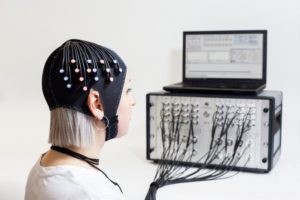6 October 2021
Using Novel Brain Imaging Technology to Improve Restorative Sleep for TBI Patients
Researcher to Watch: LCDR J. Kent Werner, MD, PhD
Restorative deep sleep may help the brain and body repair, heal, and grow – but it is difficult for both civilian and military populations to obtain. Moreover, sleep disorders affect over half of mild traumatic brain injury (mTBI) patients, which is a concern for the Department of Defense.
Changes in electrical activity in the brain can be tracked during sleep using electroencephalography (EEG) recording devices which are considered the current gold standard. However, the relationship between sleep stages and systemic changes in cerebral autoregulation and interstitial fluid flow is believed to be responsible for clearing the brain of metabolic waste. This fluid system, named the glymphatic system, is not measurable with EEG.
“This system may underlie the refreshing nature of sleep,” said U.S. Navy Lieutenant Commander Kent Werner, MD, PhD.

LCDR (Dr.) Werner proposed the modification of a technology called functional Near-Infrared Spectroscopy (fNIRS), a non-invasive, portable optical brain monitoring technique to track fluid movements during sleep. His program is called Sleep Wake Intracerebral Fluid Tracking, or “SWIFT.” He aims to use this technology to deliver clinical solutions to address health-related restorative sleep issues for the military and civilian populations.
LCDR (Dr.) Werner is a board-certified neurologist and neuroscientist with over 13 years in neuroscience research. He is an active-duty Navy faculty member serving as an Assistant Professor in the Department of Neurology at the Uniformed Services University and as adjunct faculty in the Johns Hopkins University School of Medicine.
In September 2020, LCDR (Dr.) Werner received an award through Geneva from the Uniformed Services University to pursue his research proposal titled, “A Novel fNIRS Approach for Assessment of Brain Activity, Cerebral Blood Flow and Glymphatic Function in Sleeping Traumatic Brain Injury Patients.” Through a collaboration with Johns Hopkins University Applied Physics Laboratory and Walter Reed National Military Medical Center, he is using fNIRS to assess brain activity, cerebral blood flow and glymphatic function in sleeping TBI patients.
In June 2021, LCDR (Dr.) Werner was the lead author in a manuscript [PMID: 33280032] published in Sleep, finding that poor sleep is linked to neurodegeneration in mTBI patients. Using a cohort of warfighters on who experienced, on average of eight years after mTBI injury, poor sleepers with had elevated biomarkers of neurodegeneration and lower cognitive function compared to mTBI good sleepers.
“Our research team hopes to identify the most efficacious stimulation paradigm to enhance quality and depth of sleep,“ said LCDR (Dr.) Werner. “We hope the results will expand the field of sleep enhancement and elevate the readiness level of this technology to benefit both civilian and military populations.”
This award was funded by Congressionally Directed Medical Research Programs (CDMRP) Peer Reviewed Medical Research Program Discovery Award under grant number W81XWH-19-PRmRP-DA.
Disclaimer: The views expressed do not reflect the official policy of the Army, the Department of Defense, or the U.S. Government.

"Our research team hopes to identify the most efficacious stimulation paradigm to enhance quality and depth of sleep."
U.S. Navy Lieutenant Commander Kent Werner, MD, PhD
HIGHLIGHTS
- Sleep disorders affect over half of mild traumatic brain injury (mTBI) patients.
- LCDR (Dr.) Werner proposed the modification of a technology called functional Near-Infrared Spectroscopy (fNIRS), a non-invasive, portable optical brain monitoring technique to track fluid movements during sleep.
- He was the lead author on a recent manuscript which found that poor sleep is linked to neurodegeneration in mTBI patients.


